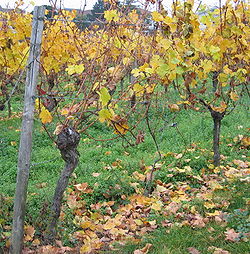- Old vine
-
Old vine (French: vieilles vignes, German: alte Reben) is a term commonly used on wine labels to indicate that a wine is the product of grape vines that are notably old. The practice of displaying it stems from the general belief that older vines, when properly handled, will give a better wine.[1] However, in France, the U.S., and most countries, it has no legal or even generally agreed upon definition.
Terminology
Grape vines can grow for over 120 years. After about 20 years vines start to produce smaller crops, and average yields decrease, leading to more concentrated, intense wines.[1] Diseases such as "dead arm" can also afflict old vines, in some cases further concentrating the juice. "Old vines" might apply to an entire estate, or it might mean only a certain parcel planted before others. In the U.S., the most common use is on Zinfandel, because in California vineyards up to 125 years old are still bearing small amounts of prized Zinfandel fruit.
Some of the oldest commercially active grape producing vineyards are planted in the Barossa Valley in Australia, one of the oldest being the Langmeil vineyard which has Shiraz grapes planted in 1843, now being 168 years old. The oldest known grape producing vine grows in Maribor in Slovenia and was planted over 400 years ago,[citation needed] it produces a token of about 35 to 55 kg grapes each year which is fermented and put into about 100 miniature bottles. The Barossa Old Vine Charter was established to protect the older vines in the region and prevent them from being removed from the ground.[2]
In a place where wine production is longstanding, it often means a wine whose vines are thirty to forty years old. Some wine makers insist the vines should be older than this. In newly-established wine regions, twenty years might be old. The definition is further complicated by the fact that certain varieties simply do not have economically viable yields when they get truly ancient.
Legal definition
Because there is no objective definition, an "old vines" wine might or might not show any specific characteristics related to vine age. Generally, the more reputable the producer, the more likely it is to mean something. Similarly, if a producer sells a "regular" and "old vines" bottling, it is more likely to represent a perceptible difference in character, if not necessarily in quality. In these ways, "old vines" is similar to "reserve," a term that also varies dramatically in its significance and in many countries and regions has no legal definition.
References
- ^ a b Robinson, Jancis (2006). The Oxford companion to WINE (3 ed.). OXFORD UNIVERSITY PRESS. pp. 739–740.
- ^ Barossa Vineyards, barossa.com, accessed 21 February 2010.
Categories:- Wine terms
Wikimedia Foundation. 2010.

